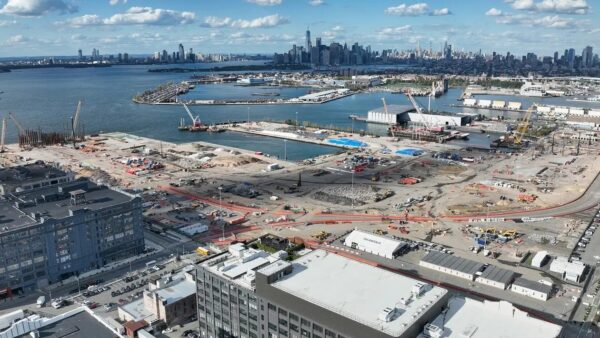The fierce debate over immigration was stoked this week by a study claiming that Brexit Britain didn’t need EU workers because 2.5 million Brits were either unemployed or stuck in part-time work.
The paper by think tank Migration Watch said the British taxpayer was spending billions of pounds subsidising low-paid EU workers, and accused some sectors of relying on EU migrants to avoid offering proper pay and conditions.
But a UK trade body for smaller construction firms rejected the claims, insisting that EU workers eased a serious skills shortage and that 70% of smaller housebuilders in London and the south-east of England relied on them. Keeping EU workers out would only exacerbate the housing crisis, warned the Federation of Master Builders (FMB).
Full employment?
Migration Watch, which campaigns to restrict immigration to the UK, published its paper yesterday.
It says that in the past 10 years net growth in employment for people born in the UK has been in self-employment, whereas most EU workers have taken “employee jobs”.
It adds that there are still 1.5 million people unemployed in the UK, with more than a million part-time workers unable to find a full-time job.
Migration Watch slams sectors that lobby for a permissive immigration policy after Brexit, saying they just want to continue to offer “low paying jobs with poor conditions and little flexibility for workers”.
And it claims the UK taxpayer is subsidising low-paid EU migrant workers because the working age benefit bill for EU migrants in the UK in 2014/2015 was £4.4bn ($5.8bn).
Serious skills gap
Rounding on the claims, Brian Berry, chief executive of the FMB, argued that construction was facing a serious skills deficit even without the impact of Brexit. He said it was serious enough to affect the UK’s economic growth and its dysfunctional housing market.
“We accept that free movement will end in the years following the UK’s exit from the EU, but the government needs to take account of the likely needs of key sectors like construction,” he said in a statement yesterday.
Housebuilding would be affected – a subject currently at the top of the UK’s political agenda.
“The shortage of skilled workers is fast rising up the list of barriers to SME builders in their quest to grow and build more of the homes the UK so desperately needs,” Berry said.
“Recent research from the FMB shows that over the next three years, as Brexit becomes a reality, half of SME housebuilders believe the skills shortage will be a barrier to growth than more traditional concerns such as the planning system. Over a third of SME house builders currently employ EU workers and this rises to 70% in London and the South East.”
Caught in a vice
The row sheds light again on the thorny issue of skills and training in UK construction. The industry is caught in a vice, with more than a third of workers expected to retire in the next two decades and a lack of new workers coming in to replace them.
Meanwhile a report this year – Modernise or Die, by Mark Farmer – found that just 57% of construction sector employers provided any training in 2015, making construction the lowest-ranking of all UK commercial sectors except agriculture in the provision of training.
James Bryce, the director of strategic workforce planning at consultant Arcadis, told Construction Research and Innovation, GCR‘s sister publication, that the degree of housing need in the UK meant that the labour shortage problem was “much more profound than people realise”.
“Some 30% of the British construction workforce is due to retire in the next 15 years. If you also consider the effect of Brexit and the loss of the EU labour pool, we’re facing a serious situation.”
Image: EU migrants make up 7.4% of construction workforce (Central European Staffing)
Further reading
Comments
Comments are closed.







The short answer is no as having personnel on sites who first language is not English and who are not fluent in written and spoken English (for many international projects regardless of country it is a prerequisite regardless of where the project actually is).
In the event of an emergency warnings are generally shouted in the operatives first language which not being every one else on sites language is inherently dangerous. We have had instances of mistaken medication in the health service.
We may need to slow down the number of projects as they do in the Scandinavian Oil and Gas industry to ensure that the maximum number of indigenous and citizens are employed and only specific expertise is imported on strictly enforced work permits.
Where additional personnel are required the issue of work permits to Commonwealth citizens should be prioritised as they are generally trained in English and to similar standards to those in the UK
How do people who are not fluent in English get the necessary permits to work on site at all?
The root of the problem in the UK stems back to the larger Construction companies, who back in the 70’s decided to use subcontract labour, rather than direct labour which cultivated apprenticeships & a constant pool of skilled labour. That saw the demise of apprenticeships in construction trades & the CITB. This was exacerbated by new Labour which derided the trade route in favour of all attending university regardless of the nebulous nature of the course offered & that is why we are in this situation. In Germany engineers & skilled trades people are held in high regard as professionals. Not so in the UK,
I cannot believe the FMB is defending the retention of EU labour. Most of their members are small builders who never trained anyone!
Give kids in the UK the kudos & encouragement to follow a vocational route. Put investment into apprenticeships & we will not need the Construction Industry to be populated primarily by EU (subsidised labour) our home grown talent could fill the void if only employers were compelled to train them
I agree with the above statements. The skills shortage has been ignored for far too long
It seems to me that the construction industry offers very few people a career, just short-term periods of work for those who already have experience and can be flexible in where they work. It is not attractive to anyone who needs stability and some training. At the end of the day if the supply of cheap labour declines then employers will need to make a better offer to attract workers.
You reap what you sow! As stated above, over decades government & large Construction companies have been implicit in ignoring apprenticeships in favour of cheap foreign labour. This has not led to cheaper prices but greater profits to fuel company profits & enhance company director bonuses beyond their wildest dreams – and we’re all paying for it!